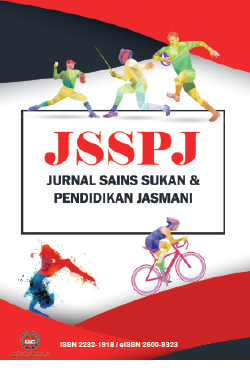Reflection on the inheritance and development of martial arts and national traditional sports visual measurement analysis based on Citespacev
DOI:
https://doi.org/10.37134/jsspj.vol10.1.7.2021Keywords:
Development, Inheritance, Visual measurement analysis, Experience, High Sensitivity sportAbstract
Martial arts and national traditional martial arts have always been the research hotspots in Chinese academic circles. In 2008, martial arts' application to join the Olympic Games failed. Chinese martial arts and national traditional sports have once again become a hot topic in academic discussions. However, the academic circles seem to have not found the essence of inheriting and developing Chinese martial arts. This research mainly uses grounded theory to summarize and discuss the research from 2008 to the present, and propose corresponding solutions. Taking 924 core documents obtained from the Chinese CNKI database about the inheritance and development of martial arts and traditional national sports as the research subject, the relevant data is analyzed and processed through the CiteSpaceV citation visual analysis software, and summarized. According to the results processed by the CiteSpaceV software, the main research directions of the inheritance and development of martial arts and traditional national sports in China from 2008 to the present are the basic theories and inheritance and development of martial arts, the basic theories and discipline construction of traditional national sports, traditional national culture, intangible cultural heritage, the development of competitive martial arts, etc. For China to realize the great rejuvenation of the Chinese nation, an important part of the great rejuvenation of the Chinese nation is cultural rejuvenation. Wushu and traditional national sports are the treasures of China’s excellent traditional culture. However, martial arts and traditional national sports must achieve a great rejuvenation. Therefore, the inheritance and development of martial arts and traditional national sports must return to the human body, and through the physical transformation of martial arts and traditional national sports, the effective inheritance and revival of martial arts and traditional national sports are completed.
Downloads
References
Bourdieu, P. (1990). The logic of practice. Stanford university press.
Chen Yaoyao & Ni Yike. (2016). Research Progress of National Traditional Sports in my country since 2008 - Based on CiteSpace III's Measurement Analysis.China Sport Science and Technology, 52(2):12-13.
Deleuze, G. (2006). Nietzsche and philosophy. Columbia University Press.
Guo Yucheng. (2015). The concept, method and system of Wushu standardization research -Based on the basic theory construction of standardization science. Journal of Shanghai University of Sport, 39 (1):56-61.
Jin Yuzhu, Wang Gang & Li Li. (2017). The Dilemma and Reconstruction of the Subjectivity of Chinese Wushu Culture. Journal of Capital Institute of Physical Education, 29(2):128-131.
Jia Qi,Li Baidong & Ynag Junru. 2009. Methodological investigation of exercise guidance at the initial stage of kinesiology formation-centered on the choice of physical exercises. Journal of Sports and Science, 30(1):78.
Long Xingnian & Wang Jinan. (2010). The current situation and development strategies of competitive martial arts in my country. Journal of Wuhan Institute of Physical Education,44(6):60-62-68.
Li Long. (2010). On the Modernization of Chinese Traditional Wushu Culture. China Sport Science and Technology, 46(2):140-144.
Li Ping, Wang Hui, Zhao Gongqun & Zhang Feng. (2017). Research on the Inheritance of Sports Intangible Cultural Heritage from the Perspective of Inheritors. Sports Culture Guide, (04):70-75.
Morris Merleau-Ponty. (2003) Translated by Jiang Zhihui. Semiotics. Beijing: The Commercial Press, 109.
Michel Foucault. (2003). Translated by Xie Qiang. Knowledge Archaeology. Beijing: Sanlian Bookstore, 59-69.
Nietzsche, F., & Friedrich, N. (1999). Nietzsche: The birth of tragedy and other writings. Cambridge University Press.
Polan, D. (2017). Francis Bacon: The logic of sensation. In Gilles Deleuze and the theater of philosophy (pp. 229-254). Routledge.
Qiu Pixiang, Zeng Tianxue & Liu Shujun. (2010). The International Strategy of Wushu Development. Journal of Shanghai University of Sport, 34(4):50-53.
Ran Xuedong & Wang Gang (2012). Strategic Thinking on "Going Out" of Chinese Wushu Culture. China Sport Science, 32(1):71-76.
Tian Zuguo (2010). Research on the Development of Chinese Traditional Sports from the Perspective of Regional Culture. Journal of Wuhan Institute of Physical Education, 44(9):66-69.
Turner, B. S., & Turner, B. S. (1992). Regulating bodies: Essays in medical sociology. Psychology Press.
Yang Xiaobin. (2010). Military exchanges-a new way for the international development of martial arts. Journal of Guangzhou Sport University, 30(2):125-128.
Xi Jinping. (2017). Decisive Victory to Build a Well-off Society in an All-round Way and Win the Great Victory of Socialism with Chinese Characteristics in the New Era—Report at the 19th National Congress of the Communist Party.People's Daily, 10-28(1).
Wang Gang & Wu Song. (2013). Research on the Development of Chinese Wushu from the Perspective of "Wushu Grand View". Journal of Beijing Sport University, 36(9):19-25.
Wang Shuiquan. (2012). The New Orientation of the Research on Learning and Teaching of the Human Movement: Taking Kaneko Akitomo's Bodily Knowledge as the Clue. Journal of Sports and Science. 33(4):34.
Wang Lin & Lu Hai. (2011). Protection and Development Path of National Traditional Sports Intangible Cultural Heritage. Journal of Wuhan Institute of Physical Education ,45(08):85-90.
Wang Qingjun & Fang Xiaohong. (2010). Intercultural Dialogue: Obstacles and Transcendence of Internationalization of Chinese Traditional Sports. China Sport Science, 30(6):14-19.
Wang Lin & Yu Dinghai. (2009). The Difficulties and Countermeasures of the Intangible Cultural Heritage of Traditional Wushu. Journal of Shanghai University of Sport ,33(04):85-88-93.
Wang Gang & Qiu Pixiang. (2008). Theoretical Research on Reconstruction of Chinese Wushu Education System. Journal of Shanghai University of Sport, 32(3):61-66.
Wei Ruibing. (2006). Keyword-based analysis of information science research topics. Information Science, 24 (9):1400-1401.
Zhang Shiwu & Yuan Ge. (2010). The cultural safety and innovative development of our national sports in the context of globalization. Journal of Wuhan Institute of Physical Education, 44(10):15-19.
Zhao Jin. (2010). The concepts of "nation", "ethnic traditional sports" and others. Journal of Shandong Sport University, 26 (10):45-46.
Zhang Zhicang & Zhang Yan. (2014). Body Cognition. Beijing: People's Publishing House. 2:346-347.





